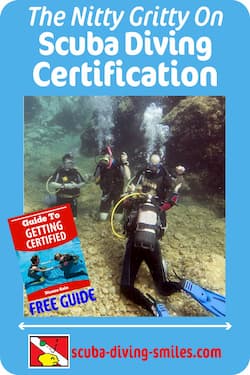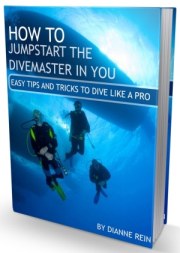Night Scuba Diving Tips:
Don't Get Left in the Dark
Are you ready to try night diving? Here are some night scuba diving tips to get you ready. If you go, you won't regret it. It's a whole new world underwater once the sun goes down.
Your first night dive can be intimidating. After all, swimming around in a dark ocean isn't the norm.
Just try and relax and rest assured, you won't be alone if you are a bit nervous for that first time night diving.
My first night dive was a shore dive, so it was a bit less intimidating to me than if we went off a boat.
We were staying at a dive resort in Roatan and could go out on our own but we hired one of the divemasters to go with us for that first dive. It was well worth it and it was a great dive.
You see so many different things at night and we just went slow and steady. No need to rush. Just take in all the night activity around you. It is fascinating.
Not that I wasn't a little scared to begin with but I soon relaxed and enjoyed it immensely. Who knew so many octopuses were out at night?
So if your are thinking about scuba diving at night, hopefully this introduction to night diving and night scuba diving tips will help you relax a bit. Try it - you'll be glad you did!
Our Night Scuba Diving Tips
- Go at Sunset
Many dive boats will leave for a night dive right before sunset. That way you have light to get your scuba gear ready. It also feels less intimidating (to me anyway) to go out while there is still some light left.

Likewise, if you are doing a shore dive, plan on hitting the water right before the sun sets.
Even though you will have some light above the water, it will still be pretty dark underneath. And by the time you surface, it will be dark out.
If this is your first time scuba diving at night, try and go to a site you are familiar with. In the Caribbean, many dive operators will do a night dive at a dive site that they went to during the day.
If you are thinking of doing the night dive, sign up to do a dive at the night dive site during the day. This way you will have some idea of what the area is like and may feel less apprehensive.
A night dive is typically a shallow dive. I would say 60 feet is probably max with 30-40 feet more the norm. On our night dives we typically had a maximum depth of 35-40 feet. More night scuba diving tips:
You obviously need some dive lights when you are doing a night dive. It's best to have a primary light and a backup light in case the first light fails. The secondary light can be small and could fit into your pocket.

You don't need the biggest and brightest light you can find. In fact, it is fun, once you get accustomed to diving at night, to turn your light off and let your eyes adjust to the dark. You'll be amazed at what you can see. Of course, it is up to you and get the light you would feel comfortable with while diving at night.
If you don't want to turn your light off underwater (I've never had a problem turning it back on but you never know) you can always face it into your BC so you get the same effect.
Many dive operators will also attach a glo-stick or something similar to your tank. This makes it easier to spot someone underwater. One dive group may have one color, another group a different color or the divemaster will have a different color so it is easier to tell who is who underwater.
Please note that some areas do not allow the use of glo-sticks due to their chemicals. In this case, another device, such as a light, can be put on the tank. More night scuba diving tips:
You will want some method of attaching that dive light to you. That way if you let go, it won't sink to the bottom, never to be seen again. A lanyard or stretchy cord (or whatever you are comfortable with) work fine. Which reminds me of one of the next night scuba diving tips:
One thing I have seen which I think is a good idea is to mark your lights or other paraphernalia with reflective tape. That way if you drop something, you be able to spot it once the light shines on it. I've seen people put an X on their BC or tank so their dive buddy can tell it's them. Something worth considering.
There is alot to see at night. You will see a whole different world underneath at night than during a day. Take your time and look in those nooks and crannies.
The reef also looks brilliant and colorful in the beam of your light. Much different than during the day when you are diving deeper and the colors are absorbed.
It is best to descend feet first and look down when you are descending. You can shine your light underneath you (just make sure you are not shining it in someone's eyes) to see where you are going so you don't hit or disturb the coral. More night scuba diving tips:
When you are night scuba diving, you need to discuss the hand signals before you begin your dive. Since it is dark down there, your buddy won't be able to see your hands.
If you are on a dive boat, the divemaster will probably tell you what signals to use. If they don't, just ask. There is nothing wrong with that.

A typical way to use hand signals is to shine your light on your hand so your buddy can see them. Another common night diving signal is to move your dive light in a circle to signify "OK." Moving it up and down or back and forth can signify yes or no.
Whatever you choose to use, just make sure you clarify before you begin the dive. Which leads into one of the next night scuba diving tips:
Be aware of where you aim your dive light. If you put the full force of that light beam into somebody's eyes, you can momentarily blind them. It will take a little while for that diver to adjust his night vision again. So be careful.
If you are new to scuba diving at night, you may go through your faster than your would during a typical daylight dive. This could be compensated for by the fact that a night dive is usually shallow, but just be aware of your air at all times. Of course, this is one of those night scuba diving tips that is applicable to day scuba diving too.
If you are doing night scuba diving off a boat, the boat should have a flashing strobe light attached to it so it is easy to find. As you are ascending, make sure you are looking up and know where the boat is so you don't bang your head.

If you are doing a shore dive, you should also know how to mark the night diving entry/exit point. The most common way is to place lights on the shoreline. You should use more than one to make it easier to spot. You could have 2 close together and 2 close together but further down the shoreline. Or whatever configuration works for you.
It also doesn't hurt to have someone on the shore to make sure the lights don't go out (or somebody doesn't swipe them). And last, but not least, the last of the night scuba diving tips:
If you happen to lose sight of your buddy, one way to find him would be to shut off your light and look for the glow of his light. He shouldn't be that far from you and you should be able to see his light.
Another, and pretty much opposite way, is to turn a full circle while pointing you light outward. You might be able to see your buddy in the beam or he might notice the movement (if he hasn't noticed you are gone yet).
If the boat has to come pick you up after you have surfaced, shine the light on yourself so the captain can see you.
And that the last of my night scuba diving tips.
If you haven't done night scuba diving, you should really give it a try. It's a different experience and isn't difficult. You just have to get used to it, like all new things. You'll see lots of new creatures and habits to add to your memories. So give it a try. I hope these night scuba diving tips will help make your first night dive a more comfortable experience.
Here are more of our scuba diving tips you can check out:
Here's to great night scuba diving!
Want to stay down longer and improve your buoyancy control and other diving skills? Our free report "Increase Your Bottom Time" along with our practical, weekly actionable tips will have you looking like a seasoned diver in no time. So come join us and see improvement on your very next dive!
(Click on the photo to join us now!)
What's New
-
Happy New Year
Jan 01, 24 06:00 AM
Happy New Year everyone! I hope everyone is well and had a fun New Years Eve! May your new year be filled with lots of wonderful dives. All the best to you and yours in 2024! Let the dives begin. -
Happy Holidays
Dec 14, 23 05:05 AM
I hope everyone is enjoying the holiday season! I am always amazed at how fast time flies and another year is just around the corner. I wanted to pop in and say hi to everyone. I am doing some full ti… -
3 Common Scuba Diving Mistakes New Divers Make
Feb 23, 23 02:18 PM
In this video, I share 3 common scuba diving mistakes beginner divers make. Learn how to correct these for a better - and safer - dive. -
Scuba Diving Tipping Etiquette: How Much And When To Tip Scuba Crew
Feb 06, 23 03:34 PM
Not sure of scuba diving tipping etiquette? In this video I share who to tip, when to tip, how much to tip, tipping on liveaboards, tipping an instructor & more -
Scuba Diving Tips For First Time
Jan 29, 23 05:41 PM
These scuba diving tips for first time divers will help improve buoyancy control, air consumption, equalization and boat diving. Improve on your very next dive!
















New! Comments
Have your say about what you just read! Leave me a comment in the box below.